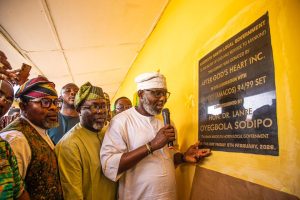
By Omodele Adigun
Anger is mounting across Nigeria over the staggering $1.2 billion lost annually to medical tourism, as citizens accuse public officials of abandoning the country’s collapsing health system for luxury treatment abroad.
The frustration intensified following the death of former President Muhammadu Buhari during a medical trip to London last week, a scenario many Nigerians see as symbolic of the government’s failure to fix the nation’s hospitals.
Health experts revealed the shocking figure during the fourth annual Public Health Grand-round at the University of Medical Sciences (UNIMED), Ondo. The keynote speaker, Dr Habibu Yahaya, the World Health Organisation’s coordinator in Ondo State, said fragile health systems and chronic underfunding have forced millions to seek medical care overseas, draining the economy and crippling the local sector.
The acting Vice-Chancellor of UNIMED, Professor Adolphus Loto, underscored the urgent need for resilience in Nigeria’s healthcare system. He stressed that building infrastructure capable of withstanding shocks is non-negotiable if the country must prevent future collapse.
Public outrage escalated as citizens and analysts questioned why public funds continue to bankroll medical trips for government officials. James Osewele, a public affairs commentator, called for a nationwide ban on overseas treatment for presidents, governors, legislators, and top civil servants. He argued that forcing leaders to use Nigerian hospitals would compel them to fix the system for everyone.
“This trend is killing Nigeria’s health sector. If they are barred from travelling for medical care, they will ensure our hospitals work because they’ll have no alternative,” Osewele said. “It’s shameful that foreign hospitals treat Nigerian leaders while our citizens die from preventable illnesses at home.”
Medical professionals also lamented the exodus of Nigerian doctors and nurses to foreign countries. Davies Olanrewaju, a Lagos-based doctor, said the poor pay and working conditions are pushing healthcare workers to seek greener pastures, leaving Nigerian hospitals severely understaffed.
“Most of the doctors treating our leaders abroad are Nigerians. Why can’t we create the same environment here so these professionals stay and serve their own people?” Olanrewaju asked.
A nurse, Victoria Omoruyi, recalled a time when foreigners travelled to Nigeria for medical care. “Now even malaria sends our leaders abroad. It’s tragic how far we’ve fallen. Until health funding meets global standards, this embarrassment will continue,” she warned.
The debate has also sparked renewed calls for legislation to ban foreign education for public officials’ children, with advocates insisting such measures will fix both the education and health systems.
As the country battles brain drain and crumbling infrastructure, experts say halting the $1.2 billion annual outflow is critical to saving lives and reviving Nigeria’s economy.




Với giao diện mượt mà và ưu đãi hấp dẫn, MM88 là lựa chọn lý tưởng cho các tín đồ giải trí trực tuyến.
iwin – nền tảng game bài đổi thưởng uy tín, nơi bạn có thể thử vận may và tận hưởng nhiều tựa game hấp
Tham gia cộng đồng game thủ tại Go88 để trải nghiệm các trò chơi bài, poker phổ biến nhất hiện nay.
采用高效谷歌外推策略,快速提升网站在搜索引擎中的可见性与权重。谷歌外推
Đến với J88, bạn sẽ được trải nghiệm dịch vụ cá cược chuyên nghiệp cùng hàng ngàn sự kiện khuyến mãi độc quyền.
搭载智能站群程序,自动化搭建与管理,为SEO项目提供核心驱动力。站群程序
kuwin sở hữu kho game đa dạng từ slot đến trò chơi bài đổi thưởng, mang đến cho bạn những giây phút giải trí tuyệt vời.
Khám phá thế giới giải trí trực tuyến đỉnh cao tại MM88, nơi mang đến những trải nghiệm cá cược thể thao và casino sống động.
Khám phá thế giới giải trí trực tuyến đỉnh cao tại MM88, nơi mang đến những trải nghiệm cá cược thể thao và casino sống động.
Tham gia cộng đồng game thủ tại Go88 để trải nghiệm các trò chơi bài, poker phổ biến nhất hiện nay.
https://askoff.ru
bad road accidents https://otvetnow.ru social mediamarketing